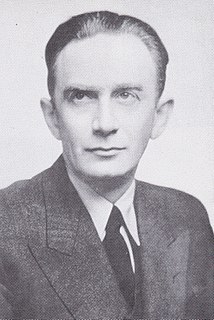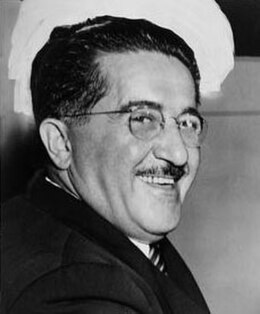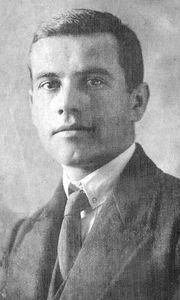Related Research Articles

Whittaker Chambers was an American writer-editor, who, after early years as a Communist Party member (1925) and Soviet spy (1932–1938), defected from the Soviet underground (1938), worked for Time magazine (1939–1948), and then testified about the Ware group in what became the Hiss case for perjury (1949–1950), often referred to as the trial of the century, all described in his 1952 memoir Witness. Afterwards, he worked as a senior editor at National Review (1957–1959). US President Ronald Reagan awarded him the Presidential Medal of Freedom posthumously in 1984.

Walter Germanovich Krivitsky was a Soviet intelligence officer who revealed plans of signing the Molotov–Ribbentrop Pact after he defected to the West.
Laurence Duggan (1905–1948), also known as Larry Duggan, was a 20th-century American economist who headed the South American desk at the United States Department of State during World War II, best known for falling to his death from the window of his office in New York, shortly before Christmas 1948 and ten days after questioning by the FBI about whether he had had contacts with Soviet intelligence.
Harold Glasser was an economist in the United States Department of the Treasury and spokesman on the affairs of the United Nations Relief and Rehabilitation Administration (UNRRA) 'throughout its whole life' and he had a 'predominant voice' in determining which countries should receive aid. Glasser was a member of the Perlo group of Soviet spies during World War II and worked closely with Harry Dexter White. His code name in Soviet intelligence and in the Venona files is "Ruble".
Charles Kramer, originally Charles Krevisky was a 20th-Century American economist who worked for U.S. President Franklin D. Roosevelt as part of his brain trust. Among other contributions, he wrote the original idea for the Point Four Program. He also worked for several congressional committees and hired Lyndon B. Johnson for his first Federal job. Kramer was alleged a Soviet spy as member of the Ware Group, but no charges were brought against him.
As early as the 1920s, the Soviet Union, through its GRU, OGPU, NKVD, and KGB intelligence agencies, used Russian and foreign-born nationals, as well as Communists of American origin to perform espionage activities in the United States, forming various spy rings. Particularly during the 1940s, some of these espionage networks had contact with various U.S. government agencies. These Soviet espionage networks illegally transmitted confidential information to Moscow, such as information on the development of the atomic bomb. Soviet spies also participated in propaganda and disinformation operations, known as active measures, and attempted to sabotage diplomatic relationships between the U.S. and its allies.

J. Peters was the most commonly known pseudonym of a man who last went by the name "Alexander Stevens" in 1949. Peters was a journalist and political activist who was a leading figure of the Hungarian language section of the Communist Party USA in the 1920s and 1930s. From the early 1930s, Peters was actively involved in the espionage activities of the Soviet Union in the United States, fabricating passports, recruiting agents, and accumulating and passing along confidential and secret information.

Juliet Stuart Poyntz was an American suffragist, trade unionist and communist. As a student and university teacher, Poyntz espoused many radical causes and went on to become a co-founder of the Communist Party of the United States (CPUSA). Later she began working as an intelligence agent for the Soviet Union, travelling secretly to Moscow just as some of her comrades were being executed in Joseph Stalin's Great Purge, after which she resigned from the party. This is widely assumed to have led to her unexplained disappearance in New York City in June 1937 as the likely victim of an assassination squad, possibly because she had been associating with Trotskyists.
Julian Wadleigh (1904–1994) was an American economist and a Department of State official in the 1930s and 1940s. He was a key witness in the Alger Hiss trials.
Arvid Jacobson was a Finnish-American Communist who spied for the Soviet Union in the 1930s.
Boris Yakovlevich Bukov, also Boris Bykov ("Sasha") Regiment Commissar was a member of the Communist Party since 1919. Bykov was head of the underground apparatus with which Whittaker Chambers and Alger Hiss were connected.

John Scott (1912–1976) was an American writer. He spent about a decade in the Soviet Union from 1932 to 1941. His best-known book, Behind the Urals: An American Worker in Russia's City of Steel, is a memoir of that experience. The bulk of his career was as a journalist, book author, and editor with Time Life.

Jessica Smith was an American editor and activist and was the wife of Harold Ware and subsequently John Abt, both members of the Ware Group run by Whittaker Chambers and whose members also included Alger Hiss.
Herbert Solow was an American journalist and co-editor of the Menorah Journal who was first a Communist fellow-traveler in the 1920s, a Trotskyist in the 1930s, and then abandoned leftist politics to work in Henry Luce's publishing empire as Fortune editor.

Alexander Ulanovsky (1891–1970) was the chief illegal "rezident" for Soviet Military Intelligence (GRU), who was rezident in the United States 1931–1932 with his wife and was imprisoned in the 1950s with his family in the Soviet gulag.

Gustav Regler (1898-1963) was a German writer and journalist.
Valentin Markin was the chief illegal rezident and director of the espionage operations of the Soviet Union in the United States from 1933 to 1934. Markin headed the activities of both Soviet military intelligence and that of the Soviet secret police during this period.
Isaac Don Levine was a 20th-century Russian-born American journalist and anticommunist writer, who is known as a specialist on the Soviet Union.
William Ward Pigman, also known as Ward Pigman, was a chairman of the Department of Biochemistry at New York Medical College, and a suspected Soviet Union spy as part of the "Karl group" for Soviet Military Intelligence (GRU).
References
- 1 2 3 Shaplen, Robert (January 1948). "Our Policy in Asia" (PDF). Nieman Reports. Society of Nieman Fellows: 28. Retrieved 19 July 2020.
- ↑ Chambers, Whittaker (1952). Witness. Random House. p. 498. ISBN 0-89526-571-0.
- ↑ Urban, Thomas: The Katyn Massacre 1940. History of a Crime. Barnsley 2020, pp. 122, 123, 130.
- ↑ Sunday in Poland, Life, September 18, 1944, p. 17.
- ↑ Lauterbach, Richard E. (1 January 1945). "Stalin at 65". Life: 62–68. Retrieved 19 July 2020.
- ↑ "R.E. LAUTERBACH, EDITOR, WRITER, 36; Ex-Chief of Time-Life Bureau in Moscow Dies of Polio-- Author of Several Books Asked Sharing of Atomic Bomb Wrote for Many Magazines". The New York Times. 21 September 1950.